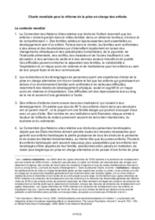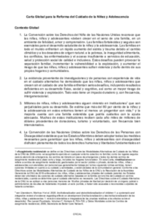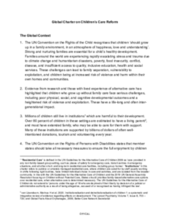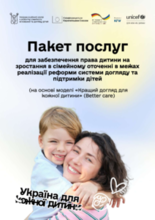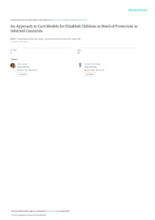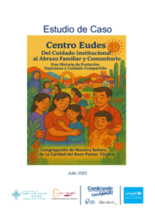Displaying 51 - 60 of 1025
La Charte mondiale pour la réforme de la prise en charge des enfants appelle les dirigeants mondiaux à agir ensemble pour: respecter la Convention des Nations Unies relative aux droits de l’enfant et la Convention des Nations Unies relative aux droits des personnes handicapées;
investir dans les familles, les enfants, les jeunes sortant de l’aide sociale et dans des services inclusifs; mettre fin à la violence à l’égard des enfants et aux pratiques néfastes telles que le tourisme dans les orphelinats
La Carta Global para la Reforma del Cuidado de la Niñez y Adolescencia es un llamado a los líderes mundiales para que actúen juntos para: respetar la Convención de las Naciones Unidas sobre los Derechos del Niño y sobre los Derechos de las Personas con Discapacidad; invertir en las familias, en las niñas, niños o adolescentes egresados del sistema de protección y servicios inclusivos; poner fin a la violencia contra la niñez y adolescencia y a las prácticas perjudiciales como el turismo en las instituciones
In January 2025, U.K. Foreign Secretary David Lammy launched an initiative to transform the lives of all children globally, so that they are cared for in families and free of violence, exploitation and other harmful practices.
The Global Charter on Children’s Care Reform is a call for world leaders to act together to: uphold the UN Convention on the Rights of the Child and the UN Convention on the Rights of Persons with Disabilities; invest in families, children, care leavers, and inclusive services; and end violence against children and harmful practices like orphanage tourism.
En janvier 2025, le ministre des Affaires étrangères du Royaume-Uni a lancé une initiative audacieuse et visionnaire : transformer la vie des enfants dans le monde entier afin que tous soient pris en charge dans leur famille et à l’abri de la violence, de l’exploitation et d’autres pratiques néfastes. Cet aperçu fournit un aperçu de la campagne et de la Charte mondiale, y compris la manière dont les pays peuvent la signer.
India is advancing child protection reforms with a growing focus on ensuring children thrive in safe, nurturing families, supported by collaboration among government, civil society, communities, and families. Insights from the National Family Summit 2025 highlight how multi-level partnerships are driving family strengthening and family-based alternative care, while also charting a roadmap to overcome systemic challenges and sustain progress.
This document outlines a minimum package of social services aimed at preventing child-family separation, supporting reintegration of children from institutional care into families, and sustaining family-based care. The package includes eight core services: resilience-building support; accompaniment for families raising orphans; early intervention; inclusive education assistance; day care for children with disabilities; social support for families in difficult life circumstances; social integration for care leavers; and supported living for young people with disabilities.
Child protection systems have traditionally emphasized remedial services over prevention, often relying on uniform care models that fail to account for children’s diverse needs. This study examines the child protection systems of countries representing various welfare models and comparatively evaluates the practices for disabled children in need of protection in these systems.
Drawing on the panel and discussions at the Global Study’s Global Conference on Justice for Children Deprived of Liberty 2024 Geneva event, this chapter outlines key elements required for deinstitutionalisation for effective children’s care reforms that are accountable to children. It proposes a two-pronged approach of systems change reforms reinforced by accountability mechanisms to achieve this for children in institutions specifically for care purposes.
The Framework for Action is an interagency initiative, led by UNICEF, Save the Children and World Vision, driving global action behind efforts to strengthen child protection systems, mobilising the complex array of stakeholders at sub-national, national, regional and global levels to implement pledges and commitments to end violence against children.
Desde Tijuana, este relato muestra cómo una comunidad religiosa, las Hermanas de Nuestra Señora de la Caridad del Buen Pastor, decidió pasar de un modelo institucional de cuidado a un enfoque centrado en las familias y la vida comunitaria, priorizando el derecho de cada niña, niño y adolescente a crecer en un entorno seguro, amoroso y protector.

